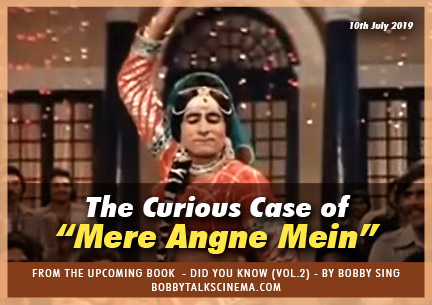
In the world of music or rather Hindi film music, at times a film song gets hugely famous, becoming a cult in the later decades and we easily start assuming a lot about its conception, unintentionally influenced by the big names involved.
The description matches perfectly with the curious case of “Mere Angne Mein Tumhara Kya Kaam Hai” from Prakash Mehra’s LAAWARIS released in 1981(music by Kalyanji Anandji), featuring the angry-young man Amitabh Bachchan, who unexpectedly enacted a drag in the supposedly funny but an odd picturisation of the particular track in the film.
But before revealing about the actual song, it would be interesting to know that where it became a mega hit (both before and after the film’s release), “Mere Angne Mein” was also heavily criticized and the makers had to do a lot of explaining or image control post the film’s release and the song’s huge success.
In fact such was the magnitude of its criticism that after receiving numerous letters from its readers, one of the most reputed Hindi Film Magazine MADHURI had to come out with an issue having its cover page mentioning the concern as “Mere Angne Mein - Jaisa Naach Gaana Kyon” with interviews of both Amitabh and Prakash Mehra explaining their individual thought process behind its inclusion.
In the interview stated in the magazine, Amitabh admitted that he knew that his song and the drag act in LAAWARIS has not been appreciated by many but the viewers need to understand that there is a lot in film business which is not in our hands and one cannot blame only the star for any such specific inclusion. At the same time he also agreed that the song was worked upon on his suggestion only and the director is not entirely responsible for the same.
But further revealing the actual story, he said that initially the song was to be used conveying an emotional connect with the hero’s mother played by Raakhi (who actually sings it first in the film’s opening sequence). But post the recording, no one thought that this can be used as an emotional tool in the narration. On the contrary, it demanded to be filmed in a much lighter and different mood taking the story forward.
On the point of its double meaning lyrics, Amitabh said that he really didn’t find anything wrong or offensive in the wordings, as it was plain funny and he had heard it several times in the past, sung by people at various occasions since it was originally a traditional folk song of Uttar Pradesh. Moreover its onscreen execution actually turned out quite well becoming a major attraction for the film that worked big time, though having its own share of criticism.
The denial about the track being a cheap insertion also came from director Prakash Mehra, who stated that he had earlier heard the song sung by Amitabh in a Holi celebration and in a Kalyanji Anandji show of his film MUQADDAR KA SIKANDAR organized in Mumbai’s (then Bombay) Brabourne Stadium. Looking at the favorable response of the public they decided to somehow use it in their next venture.
Countering the question of it being vulgar and distasteful as per the team’s set standards in the past, the director answered that he never felt or looked upon the song from that angle and had used it in the film establishing the lost emotional connect between his key characters. Besides another reason for its inclusion was his intention to create something fresh and new for Amitabh’s gigantic fan following. Keeping that in mind they together conceived it as a special attraction of the project (which eventually got excitedly promoted by the music company) and therefore inserted the song in the final reels of the film keeping the curiosity alive.
However the criticism was not just about the track, but also about its lyrics credit being given to Dr. Harivansh Rai Bachchan in the initial LP Records released by HMV music company (now SAREGAMA). Interestingly the name was later deleted from the next lot released and the space was kept blank with no mention of its lyricist at all, which ideally should have been changed to Music & Lyrics - Traditional.
As per Mehra, he was earlier informed by his team that the song had been penned by Dr. Harivansh Rai Bachchan, which was not correct as it was indeed a traditional folk song of Uttar Pradesh. So when they later came to know about the fact, the mention was deleted from the LP Records and the film credits also stated the names of only two lyricists as Anjaan and Prakash Mehra.
In continuation of his explanation Mehra further explained that they were later also told that basically the song was in Awadhi which Dr. Bachchan had edited/translated in simple Hindi and therefore was occasionally sung by Amitabh since many years. The strong association also gave them an impression that perhaps it was written by Dr. Harivansh Rai Bachchan.
Anyway, the above acceptance also doesn’t seem to be correct as there is another amazing twist in the case of this controversial song and its use in Indian/Hindi Cinema.
6 years before LAAWARIS, the same song was sung with a little variation of words as “Mere Angna Mein Kisi Ka Kya Kaam Hai” by Naresh Kumar in film MAZE LE LO directed by Kumar Vasudev and it was picturised as a stage-program without any change of get-ups by the male lead performer. The film’s music was given by Mahesh-Naresh and surprisingly the song’s lyrics were also credited to Naresh Kumar on its LP Record.
(Giving its deserving due, MAZE LE LO had another rare feature related with its soundtrack, which I came to know holding its LP in hands reading all the names mentioned. But will like to discuss it later in another short but Exclusive article soon.)
The credits of lyrics given to the singer-composer in MAZE LE LO was certainly not the right thing to do as the song did have a folk origin and had already been used in another major film five years before MAZE LE LO, though not as a pre-recorded track.
In 1970, Merchant Ivory Productions came with their English film BOMBAY TALKIE directed by James Ivory with a theme related with the Hindi film industry, featuring Shashi Kapoor in the lead. It was a major project with many renowned performers from India and had some unique features, which again deserve to be stated in another dedicated article (will try to write about it too soon).
The film had a sequence wherein Nadira is enjoying a song sung by Anwar - one of three young boys surrounding her, the other two being Jalal Agha and Mohan. Anwar here sings the same track with the same lyrics as heard in LAAWARIS saying “Mere Angne Mein Tumhara Kya Kaam Hai” and Agha keeps making musical sounds along with playing tabla on Nadira’s leg. Their fun-time gets interrupted; the moment Shashi enters the room in a puzzled state.
Coming to the conclusion, the famous “Mere Angne Mein” which surely has its origin in the folk music of Uttar Pradesh, was not anything fresh or novel written by a lyricist in either LAAWARIS or MAZE LE LO or in the reputed international project BOMBAY TALKIE. As a matter of fact, this remains the truth for a few other famous Hindi film songs too, having their origin in the rich Indian Traditional Folk Music that not always gets a clear mention in the credits.
Cheers!
(10th July 2019)
Copyright – Bobby Sing (Hapreet) / BobbyTalksCinema.com
Note: The chapter is a part of my upcoming book DID YOU KNOW Vol.2. It has been shared here on the website for all reader friends as an early promotion of the book most probably coming before the year end.
----------
 For more interesting articles on lesser known facts on Hindi Cinema, do try DID YOU KNOW Series by Bobby Sing available in both Book and E-book form.
For more interesting articles on lesser known facts on Hindi Cinema, do try DID YOU KNOW Series by Bobby Sing available in both Book and E-book form.
Also available
at Flipkart, Infibeam and Notionpress stores (in India)
And at Amazon-com and Amazon-co-uk abroad.
The E-book available at Amazon Kindle, Google Play, I-Books and Kobo.
Hope all friends opting for it have a good time reading.


 For more interesting articles on lesser known facts on Hindi Cinema, do try DID YOU KNOW Series by Bobby Sing available in both Book and E-book form.
For more interesting articles on lesser known facts on Hindi Cinema, do try DID YOU KNOW Series by Bobby Sing available in both Book and E-book form.